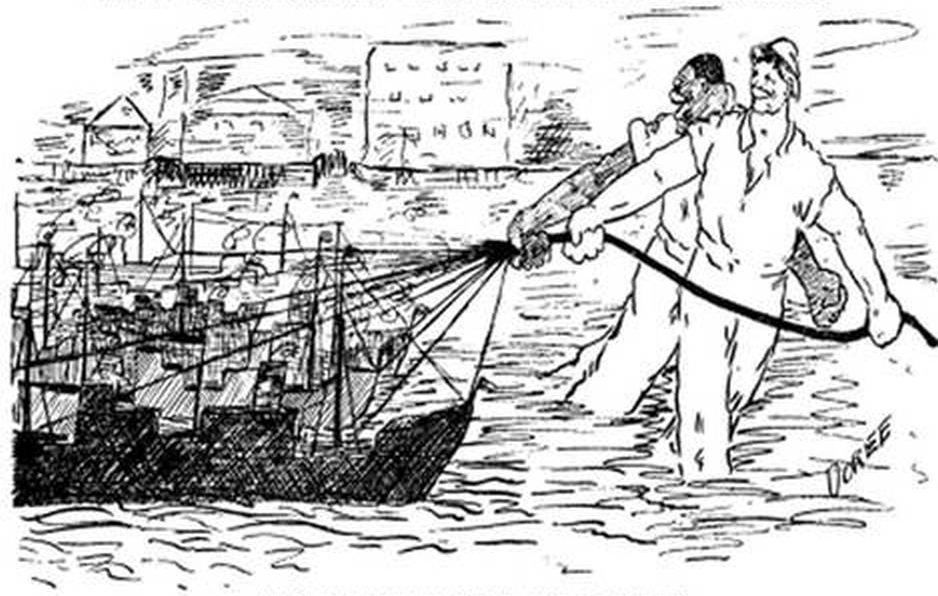Transcribed from the 6 February 2016 episode of This is Hell! Radio and printed with permission. Edited for space and readability. Listen to the whole interview:
“If we want to talk about getting to a post-capitalism utopia, we can’t premise it upon an identity that is grounded upon work—factory work or even service work. We need to recognize that a post-capitalist utopia is not going to be utopia of work, it’s going to be a utopia from work.”
Chuck Mertz: Post-work society? That sounds like a utopian dream that none of us will ever attain. Or will we? Here to tell us why we are facing a post-work society, and how we can get there, Nick Srnicek is co-author of Inventing the Future: Post-Capitalism and a World Without Work, which he co-wrote with Alex Williams.
Welcome to This is Hell!, Nick.
Nick Srnicek: Hello, thank you for having me on.
CM: So Nick, Yogi Berra’s euphemisms are dismissed as nothing but contrarian, non-sequitur punchlines that really old people quote. But there are those that are very profound, like “The future ain’t what it used to be.” In fact, that is one of the tag lines that we use here on This is Hell!
You write, “Where did the future go? For much of the twentieth century, the future held sway over our dreams. On the horizons of the political left, a vast assortment of emancipatory visions gathered, often springing from the conjunction of popular political power and the liberating potential of technology. From predictions of new worlds of leisure to Soviet-era cosmic communism to Afro-futurist celebrations of the synthetic and diasporic nature of Black culture to post-gendered dreams of radical feminism, the popular imagination of the left envisaged societies vastly superior to anything we dream of today.”
Do you think that optimism about the future was unique, even unprecedented? Was the twentieth century a new time of hope in the world that never happened before and likely will never happen again?
NS: I don’t think it was unique. A lot of those [twentieth century] visions and beliefs that the world could be better sprang largely from modernist visions of the future in the eighteenth and nineteenth centuries. What’s happened since then has been the defeat of the left, and any idea of a better future has been completely decimated under capitalism. We’ve been left in a state in which it seems almost absurd to think about the future in a utopian or even just a positive way.
CM: Was there something driving that hope for the future that no longer exists today? Or were we all just simply naive?
NS: There were good materialist reasons for it. The early labor movements in the US, for instance, were widely populated with utopian visions of the future, and part of that had to do with a real sense among the workers that capitalism was a transitory stage. They had seen it, within their lifetime, come up and radically change world lifestyles, throw people into urban spaces, industrialize—and then seen how quickly those things could be wiped away. Workers really had a sense that capitalism could also be wiped away, and that some sort of post-capitalist world was just over the horizon.
In the early twentieth century, there were all sorts of utopian ideas within the labor movement. And it isn’t just naive—it does have a real material basis in the changing conditions of the economy.
CM: You write of this hopeful future that we envisioned back in the twentieth century: “Through popular political control of new technologies, we would collectively transform our world for the better.”
How much have we fallen short of that future because of the lack of a sense of—or even the attack on—the commons, public space; the embrace of individuality and the self-made myth; and a culture that’s turned its back on working together, working collectively, and dismisses things like community organizing or the real need for labor organizing?
NS: We’ve moved very far away from that vision of the collective control of our destiny. And again, this isn’t just naive, it’s not just an imposition on people, there are real reasons why people have turned more and more towards individualism. It’s basically because of the post-1970s decimation of unions, the decimation of collective ideas. It’s left people fending for themselves, so the surest way to survive in the world today is to be self-interested, to be highly individualistic, to foster partial and temporary attachments to things and people rather than building more long-standing communities.
So it’s not really any surprise to see that individualism has become the dominant way of thinking nowadays. I think we can revive that collective sense, but it’s incredibly difficult, and we need to think about not only cultural hurdles—reigniting the imagination of people—but also the material hurdles. How do we get workers to understand that they need to be working together? How do we recognize the inherent limits, in a globalized world, to building that collective project?
CM: Is it the hurdles? Or is the left unable or unwilling to really push for revolutionary change because they’re in some sort of denial about the shortcomings of capitalism?
NS: Again, I hate to ascribe any naivete or stupidity to people. I think reformism is rather an expression of the situation of defeat that the left finds itself in. Even if you can theoretically, abstractly understand that massive changes are needed, thinking of revolution, thinking of the process of getting there is incredibly intimidating. Reformist ideas are an expression of the fact that we just don’t know what to do other than that.
This is not to say that reforms are completely useless. We do need to think about how we change the conditions on the ground. One of the arguments in our book is that the ideas of the classic labor movement, premised upon the male industrial worker within a factory, no longer hold, so it needs to rethink itself—and not just in terms of logistics workers, retail workers, and IT workers, but also increasing numbers of people doing precarious work, the underemployed, and the completely unemployed. How are these people taken into account, into a broad leftist movement?
This is the way out, to start rethinking how an identity can be mobilized around this, how these people are brought together to work together to see their common interest, and how they can enact a political force that can actually bring about change.
CM: Were we on a trajectory for a better future, and we just got derailed, sidetracked? Or has some overarching philosophy had a negative impact on all of us?
NS: This is a bit of a controversial argument, but I think actually, say in the 1960s or 70s, we weren’t actually headed towards a better world. I think the post-war compromise between capital and labor was immensely beneficial for a some people, but it was also premised upon imperialism abroad, upon patriarchy within the household, and upon racial divides within the country. The post-war golden era of capitalism wasn’t great for a whole lot of people.
The story that was being told among the left in the 1960s and 70s was that the industrial worker would lead the way and that supporting the labor movement was the way forward to bring about some sort of post-capitalist utopia. The problem with that, as we see now, is that de-industrialization seems to be a necessary process of economic development, and along with de-industrialization comes the end of the factory worker.
If we want to talk about getting to a post-capitalism utopia, we can’t premise it upon an identity that is grounded upon work—factory work or even service work. We need to recognize that a post-capitalist utopia is not going to be utopia of work, it’s going to be a utopia from work. This requires moving away from the traditional work-based identity which abounded in the 1960s and 1970s.
So I don’t think that things were actually on their way to being all that much better back then. And when capitalism ran into crisis in the 1970s, the neoliberal response was one possible response but I don’t think the left had any better responses—none that would really fix the issue.
“Most people would still want to do some work. But at least then we’d have a freely-chosen ability to say, ‘I want to do this job,’ and to turn down jobs which are demeaning, degrading, pay too little, or just have a boss who’s horrible.”
There’s been a rethinking among the left premised upon rethinking workers’ identity and the focal point of political change, also taking on board non-worker-based identities: gender identities and racial identities. The past thirty or forty years, if we put it in a positive light, have been a rethinking among the left of what needs to be done, of what the basic conditions of meaningful political change are.
I think today—and this is my optimistic take—we’re seeing those sorts of possibilities open up again. In part because of the changing economy, but also in part because of the crisis of 2008 and the rise, once again, of a sense that capitalism is not unimpeachable.
CM: You describe a life today that has not gotten better but worse. When you ask people today whether they think their children will have a better life or a worse one, a lot more today are saying worse. If this system is worse than what we had, if this life is not as enjoyable, then why isn’t there a rush to go back to the life we had when there was hope and the idea that the future could bring something better?
What explains the continuing support for this system and the rhetoric that empowers it? In other words, as the right may have said back in the 1980s: what about the children?
NS: When I ask my students about their take on the situation of the world today, it’s invariably a very negative, pessimistic take. They realize that they are being screwed over. When I ask them what they can do about it, the answer is always, “nothing.”
People entirely recognize that something is wrong, they just don’t know what to do to change it. This is in part, again, the collective defeat of the left, the end of unions and the traditional labor movement, and the rise of individualism which has left people without any sense of collective power. But there’s also a dearth of ideas.
Occupy was an interesting expression of this. Occupy comes along and says, very cleanly and very nicely, that the problem is inequality. It’s the 99% versus the 1%. This mobilizes millions of people around the world. It gets to the heart of something, and it gets to something that people feel. They recognize this divide. But then we get to the question of what should be done. What sort of future do we actually want?
Occupy really ran into this problem of being unable to articulate what they actually want. This is suggestive of another problem: not just the lack of collective power, but the lack of a vision for what we actually want, the lack of a vision for the future.
Our book is an attempt to propose one possible option. We recognize that we’re white males in developed countries and have a very partial perspective on things, so what we want to do with the book is suggest that the left more broadly be putting forth visions of the future, and that we start to have a debate again about what we actually want.
CM: Alex and yourself have a chapter in your book, called “Post-Work Imaginaries,” that is introduced with a quote by Arthur C. Clarke: “The goal of the future is full unemployment.”
What do you mean by a post-work society? Is a post-work society a post-money society?
NS: No. It’s not a post-money society, yet. We’re quite careful in the book to outline what exactly a post-work society is and isn’t. Technically speaking, it’s not even post-capitalist. We still have money, we still have markets, we still have firms dominated by the need to make a profit. But what a post-work society is, is a liberation from the need to get a job in order to survive.
Let’s make a distinction here between a task that takes effort and “work,” or a job. Work, or a job, is what you get paid for; you go, traditionally, nine to five, into a workplace, and you get paid for it. That’s what we want to end. What we don’t want to end is any sort of task that involves effort or hard work. We think about the activities that we do for pleasure: a lot of them involve hard work and effort. Reading a book takes a lot of effort; even socializing with friends can take a lot of effort; playing sports, learning a musical instrument, learning a new language—all of this takes effort, but it’s not “work.”
So when we say a post-work society, we mean that we want to end wage labor. We want to end jobs. Now, I don’t think it’s possible to fully do that, but we can make significant progress toward it. This is on the premise of all the automation of work that is possible; much of the most demeaning work that people have to do could be automated.
It’s a matter of building up a social system which enables people to live without having to rely upon a job. The issue of automation and employment right now is that if your job is automated, you are tossed out and you have no source of income. Maybe you have a few benefits that don’t last very long and pay for very little, but that’s about it. We want to build up the policies that enable people to actually step away from work and live a free and fulfilling life without necessarily having to find a job.
I think most people would still want to do some work. But at least then we’d have a freely-chosen ability to say, “I want to do this job,” and to turn down jobs which are demeaning, degrading, pay too little, or just have a boss who’s horrible. This is what we’re talking about when we talk about a post-work world. It’s freeing people from the necessity of having to get a job.
CM: You write of a post-work society: “Such a future is undoubtedly risky, but so is any project to build a better world. There are no guarantees that things will work out as expected; a post-work world may generate imminent dynamics towards the rapid dissolution of capitalism…or, the forces of reaction may co-opt the liberated desires under a new system of control.
“Concerns about the risks of political action have led parts of the contemporary left into a situation where they desire novelty, but a novelty without risk. Generic demands to experiment, create, and prefigure are commonplace, but concrete proposals are all too often met with a wave of criticism outlining every possible point at which things might go wrong.
“In light of this dual tendency for novelty but against the risks inherent in social transformation, the allure of political ideas celebrating spontaneous events becomes clearer. The ‘event’ as revolutionary rupture becomes an expression of the desire for novelty without responsibility. The messianic ‘event’ promises to shatter our stagnant world and bring us to a new stage of history conveniently voided of the difficult work that is politics.”
So Nick, are these events, then, a distraction for the opposition, keeping them from doing the continuing, sustained action required for change? And how much is that action undermined by—how difficult is it to take that sustained action within—our work society?
“The universalizing tendencies of neoliberalism are never fully complete. There’s always space left over, there’s always space to mobilize action from. That’s what we need to be looking for. The difficulty is that we live in such a work-centric society, with jobs paying less and less and debt burdens increasing more and more. People have to work. A lot.”
NS: When we make these comments about novelty without risk, it’s largely aimed at the academic left. I think the activist left is much better—it has different problems. But if you want to get a career within the academic left, you just become critical of everything. You never make a positive proposal beyond the generic idea that we need to experiment and create and generally be radical without specifying exactly what that might mean.
Is there an over-reliance on the event? It partly, again, goes back to the defeat of the left, and it’s a matter of searching for some position of hope and optimism and thinking about how we can still have radical change in a world that seems so immune to radical change.
A messianic event—when something radical happens unbidden by anybody and drastically changes the conditions of the world—that, to me, just seems like religion forced upon traditional leftist ideas of political change. It relies on faith; it relies on a passive belief that we can just wait for things to happen, and eventually an event will happen and we can take advantage of it.
I think that’s all mistaken, and I think the left can and should be much more active. The universalizing tendencies of neoliberalism are never fully complete. There’s always space left over, there’s always space to mobilize action from. That’s what we need to be looking for.
The difficulty is that we live in such a work-centric society, with jobs paying less and less and debt burdens increasing more and more. People have to work. A lot. I have had those times where I come from work and I would like to go out to some sort of political activist meeting, but I’m just exhausted. That’s probably common to a lot of people who would like to be more involved in politics. They would like to do something, but they’re just so exhausted.
This is part of the promise of a post-work world: that it frees people from their everyday exhaustion—both mental and physical exhaustion—and enables people once again to start to build up communities, talk to people in their neighborhoods, talk to people in their workplaces, and really start to feel the collective again. This is really the promise of the post-work world: it’s a step, at least, towards something else. It builds the power of the left in ways that I think are really, really important.
CM: How much do you think austerity undermines the prospects for the future?
NS: I think austerity is a necessary response to the current conditions of capitalism. I don’t think that it’s only a cynical ploy by the elites and the rich to take more. It’s partly that, but it’s also a necessary reaction to financialized capitalism as we have it today.
Is it, then, symptomatic of longer-term decline? And does it indicate longer-term problems for the left? I think for a large part it does. Because the tendency here, ideologically, will be to cut down the welfare state and ideologically support that through more and more vicious attacks against the poor, the unemployed, immigrants, etcetera. This is going to make it increasingly difficult for the left to make the exact opposite case, the case for something like a post-work world.
But that being said, I find it quite encouraging that when people talk about robots and jobs and things like a Universal Basic Income, many seem to recognize these issues. There seems to be a sense in which there is a common belief that these are the issues and that if those are the problems, they are structural problems that require structural responses. So there is some imminent sentiment available there that the left could play on, in order to say that unemployment and these sorts of things are not the failings of an individual—it’s not that they’re lazy or anything like that—instead it’s indicative of the problems of capitalism itself.
I think we can build upon that—and austerity is going to help to further that in some degree—for a future left project.
CM: I know this is much too limiting, but do you believe, then, our future comes down to two choices? Either an anti-modern future ruled by austerity and enslaved by debt, or a world that embraces the future and expands our freedom? And if that is the case, then what explains the inability of the left to show people that those are our two options?
NS: I think it’s a nice way to put it polemically, between those two options. It’s always going o be more options than just those two. But if we look at the trajectory that we’re on, it doesn’t suggest anything nice for the average person. It doesn’t suggest that things are going to get better. So the left really needs to make a case. Again, it’s been very good at criticizing. We’ve been very, very good at saying, “Here’s a problem; this is an issue; we don’t want this.” We need to get better at saying what we do want, and creating desirable visions for the future.
And we can see this as an expression within Obama’s election, and also the Sanders movement right now: that there’s hope for something better, and this is what brings people behind them. It’s a matter of how you tap into that hope, and give people not just an empty hope but an actual concrete sense of what the world could look like and how our lives could be much, much better. And then what do we need to do to get there.
I think the left really needs to combat imposed imaginaries, and put forth its own imaginaries for the future, to bring people behind it.
CM: Nick, I’ve got one last question for you, and it’s what we call our Question from Hell, the question we hate to ask, you might hate to answer, or our audience is going to hate your response. You write, “Capitalism misattributes the sources of technological development, places creativity in a straightjacket of capitalistic accumulation, constrains the social imagination within the parameters of cost-benefit analysis, and attacks profit-destroying innovations. To unleash technological advancement, we must move beyond capitalism and liberate creativity from its current strictures.
“This would begin to liberate technologies away from their current purview of control and exploitation, and towards the quantitative and qualitative expression of synthetic freedom. It would enable the utopian ambitions of megaprojects to be unleashed, invoking the classic dreams of invention and discovery. The dreams of space flight, the de-carbonization of the economy, the automation of mundane labor, the extension of human life, and so on, are all major technological projects that find themselves hampered in various ways by capitalism.”
So Nick, my Question from Hell for you is: can capitalism save us from climate change? And if capitalism cannot save us from climate change, can both humans and capitalism survive climate change? Or does one of us have to go?
NS: It’s a very good question. It’s been quite interesting to look at the state of renewable technologies, and we have actually reached a point where there is cost parity between renewable technologies and traditional greenhouse gas emitting energies. So this is quite interesting. Capitalism has led to a situation where we have the technologies to solve climate change.
That being said, you’ve got all sorts of inter-state conflicts that could make it very difficult for those sorts of technologies actually to be implemented. We live in a world where billions and billions of dollars have already been invested into infrastructure based around oil, coal, and those sorts of things. Those things aren’t just going to get up and leave. To change that is going to involve trillions of dollars.
It is abstractly possible that this will happen, but it seems wildly unlikely. I think on a more fundamental level, we also have this tension between capitalism as a system which necessarily has to grow, necessarily has to accumulate—if it stagnates, it runs into problems—and the limits of the world. We live on a finite planet, and capitalism, taken logically, is an infinite system. On that fundamental level, capitalism is incompatible with solving climate change.
There has been some fantastic work done around this, about how we need to move beyond capitalism in order to save the world and save humanity. These sorts of things, post-work and post-carbon sorts of economies, are going to be two key pillars of any future left over the coming decades.
CM: Nick, it has been a pleasure having you on This is Hell! this week. Thank you so much.
NS: Thank you very much.





